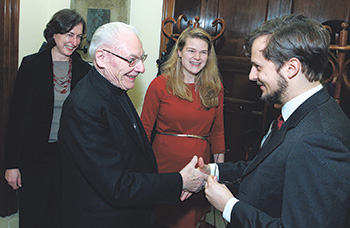
By Carol Glatz
VATICAN CITY (CNS) – A pivotal moment in the modern history of the Catholic Church came to life on screen with a new documentary about the Second Vatican Council.
With archival footage and exclusive interviews with prelates who attended the council sessions between its opening in 1962 and closing in 1965, the film pieces together firsthand accounts of that historic era and its impact on the Church today.
“It’s a sort of oral history featuring only the voices of people who were at the council and involved in the creation of the council documents,” said Robert Duncan, multimedia journalist with Catholic News Service (CNS) and the film’s co-director.
The entire narration is supplied by 12 bishops and priests who took part in the council, including Pope Benedict XVI, who gave an unscripted talk about the council to Rome’s clergy in 2013.
Authority and Authenticity
The idea of putting today’s still-living council fathers onscreen to share their vivid memories was meant as a way to “go to the source and have them tell the story, and that lends a kind of authority and authenticity,” said Francis X. Rocca, CNS Rome bureau chief and the film’s director.
Titled “Voices of Vatican II: Participants Recall the Council,” the 50-minute documentary represents the news service’s first foray into longer-form film production as part of its expanding multimedia operation.
“Catholic News Service is first and foremost a news service,” said Tony Spence, editor-in-chief of CNS. The new documentary, however, represents “the perfect example” of “taking news from the past and putting it together in a new and dazzling way for the people now and for posterity to use,” he said.
The film had its Rome premiere in the heart of the Vatican in a rarely-used 60-seat movie theater managed by the Pontifical Council for Social Communications.
It was appropriate to have the showing in the shadow of St. Peter’s Basilica, where thousands of cardinals and bishops from around the world convened so long ago, Rocca said.
The invitation-only event included one of the men featured in the film, French Cardinal Paul Poupard, who served as an expert theological adviser at the council, as well as other cardinals, bishops and religious whose lives and vocations were forever marked by the council.
U.S. Sister Judith Zoebelein, a Franciscan Sister of the Eucharist who works at the Pontifical Council for Interreligious Dialogue, said the council opened while she was in high school.
She said she saw that the Church in society “had sort of led the way by being open, being alive and being new.”
